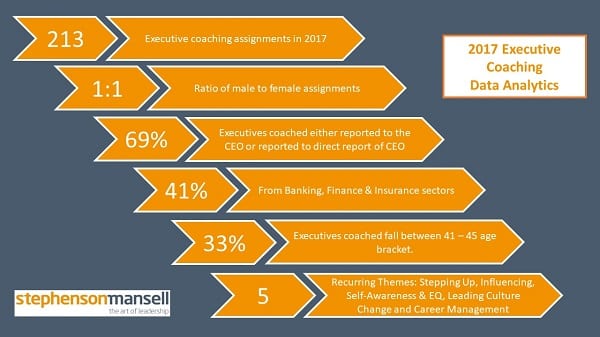Frequent fliers: How to be out of town, not out of the loop
The Art of Leadership Newsletter
To be able to move forward and optimise our impact in the workforce for 2018, it is always beneficial to learn from past lessons… So, what has Stephenson Mansell Group been doing in 2017 and what have we learnt…
We have seen a significant increase in businesses wanting to focus on team alignment. Learning how to work together more effectively, to align goals and inspire collaboration are the three key themes referenced to developing team alignment. As a coach, this means empowering others to know how to show up to every conversation with a curious and questioning mind, and to listen and ask great questions.

Ever since joining this industry, the one recurring theme I have seen year in and year out, is showing managers how to step up to executive level leadership roles both in a personal, as well as a transitional sense. On a personal level, doing so with executive presence and gravitas, with personal communication effectiveness and the ability to negotiate and manage senior level politics and relationships. On a transitional level, this could mean showing leadership while moving from being a great technical leader to managing through people. Coaching is used to guide you through these situations to ensure you can be impactful in everything you do with all levels of your organisation.
Regards,
Virginia
Frequent fliers: How to be out of town, not out of the loop

Frequent fliers are surrounded by people all day – right up until the time that everyone else goes home and they are left exploring for power points in their hotel room or trying to Skype family or friends before they go to bed.
People who travel a lot understand the loneliness and the disconnection that can come from being “out of the loop” at home and at work.
Often, when these executives come to coaching, they acknowledge feelings of low mood and disengagement, but they don’t always connect it to the strain their constant absences put on their relationships.
They say things like “I’m not sleeping well”, “I’m feeling a bit flat”, or “I am a bit disengaged from my work”. They can attribute it to the stresses of their work, but often have to be reminded to take some time to look after themselves and to reinforce their bonds to their family and friends.
I was reminded of this watching the Australian tennis championships throughout January and the pressure on elite athletes. In an article in London’s Daily Telegraphy, Andy Lane, a sports psychologist at the Centre for Health and Human Performance in London said that tennis is especially difficult to deal with emotionally because of how often players are reminded of their shortcomings. Life at the sharp end of the tour –with players constantly travelling, staying in anonymous hotels and with little time at home – is hardly conducive to a positive state of mind. A top ranked tennis player explained how the lifestyle became too much. “I was homesick and missing milestones in people’s lives.”
With this in mind, here are eight simple routines that you can adopt to overcome feelings of disconnection whilst you are away.
Eight ways to stay close
- How to stay connected: Put appointments into your diary to Skype or phone the people you love and other connections you need to nurture in your private and work life. Work around your family’s schedule, call when you know they are not busy with meals, homework or their favourite TV program. If you have teenage children, think about how they like to communicate and consider “meeting” them there, on SMS, Facetime, Instagram – if that is where you are more likely to get a response.
- How to settle back in: There may be an awkward phase on going back home, even after only a few days. Your ‘significant others’ may appear to have coped perfectly well without you, leaving you feeling unneeded, or even unwelcome. This is a common story that happens to many travelling executives. Give everyone a bit of time to readjust. And remember that the same dynamic can happen at work. Be sensitive to the fact that your comings and goings can disrupt the people around you in multiple environments.
- Use distance as a positive: Think about the ways that being physically remote can be an advantage in relationships. Can you have the kind of conversations online and on the phone that you would never have in person? Can you listen better without distractions when you are away? Is anyone more likely to discuss their challenges with you if they can’t see you? Make sure, when you are in conversation, to move away from your work or anything else that may take your attention away. Sometimes, using a headset and going for a walk can help you give someone your full attention.
- Schedule one-one-one time: When you return home, you may think of reconnecting with your partner via a “date night”. But it could also be good to schedule some one-on-one time with each member of your family – even if just in the car. Find opportunities to play taxi driver: that’s where real conversations often happen. Or come up with other ways to do this, like reading a story to a child before bed or joining them as they take the dog for a walk.
- Bring something back: When you return, bring something with you to indicate that you have been thinking about them while you were away. It is important that this is more than a generic type of ‘present’ It could be as simple as something around you that you didn’t have to pay for that could spark a conversation about where you have been. It is a way of bringing the people you love into your world.
- Maintain a social group: It is easy to fall out of circulation, so social media can be a great way to maintain connections. You can start a group of mutual friends on Facebook, just to keep a conversation going. Organise meet-ups when you get home. Accept that people will forget about you if you aren’t around, so you have to make the effort. Put your best friends’ birthdays in your diary and make sure you send them a message on the day. And, on each flight, write a personal email to someone you care about, and send it as soon as you can after landing. None of us do this enough.
- Take care of yourself: Ask yourself if each trip is really necessary and be prepared to set boundaries around expectations of your availability for such travel. Your managers will not know that the trips are putting stress upon you and your relationships unless you let them know about it. These things can often be renegotiated.
- Find ‘me time’: Ensure the person booking your travel is allocating time for exercise, rest, meals and travelling – especially for trip that may cause jetlag. According to livescience.com, your body adjusts better to long haul travel when heading west (lengthening the day). Also, for every time zone that you cross, it takes around a day to recover from jetlag (around three to four days from the Perth to Sydney route). Bright light in the morning can also aid recovery.
Kind regards,
Joanne Lum

About the author: Joanne Lum has been a Leadership Coach and Facilitator since 2000. Her background as a Clinical Psychotherapist, together with her understanding of what it is to be an effective leader and manager of people – gathered from more than 18 years in the corporate sector – makes Joanne well-placed to assist individuals and groups in developing themselves to become more skilled and capable to manage and deal with the complexity and demands of leadership and management in 2018.
What’s On

Want to improve your impact and presence in leadership situations?
Peter Kingston will empower you with tips, tools and approaches to do just that in his one-day Executive Presence and Impact Workshop. View the video to find out more about what you can expect.
Designed for corporate influencers, this workshop will provide you with insight and performance techniques to suit your learning goals; to develop confidence and presence; and to be more influential.
February workshop SOLD OUT! June workshop JUST ANNOUNCED! Click here to register.

Perspectives on Leadership for Women is back again for 2018!
Designed to help female senior leaders to align who they are and how they do it.
Brought to you in a practical way by: focusing on personal presence and communication, resilience, change and complexity, and finding your mentors and sponsors – and also supported by two individual coaching sessions with a member of our coaching team.
Don’t miss this opportunity to also become part of the Perspectives on Leadership for Women Alumni. A unique networking group for like-minded leaders.
Sydney – Perspectives on Leadership for Women – 4 May & 1 June 2018
Sydney – Perspectives on Leadership for Women – 19 October & 16 November 2018
Brisbane – Perspectives on Leadership for Women – 26 October & 30 November 2018
What’s Trending in Leadership?

The World Health Organization describes stress as the “global health epidemic of the 21st century.” Managing stress and building resilience in the workplace is essential for all leaders. So, how do you boost resilience at work?
Associate Professor Peter Connaughton, president of the Australasian Faculty of Occupational and Environmental Medicine argues that to reduce the volume of sickies, stress claims and mental illness in the workplace, more must be done to provide “good work” for employees.

Are you a Frequent Flier and have a leadership role? Professor Peter Hawkins, of Henley Business School in the UK, shares tips on how to lead at a distance and to lead teams that are virtual, international and multicultural.
Communication is key when managing a virtual team. Explore some further tips and strategies on how to establish the most effective team when distance is a factor.








